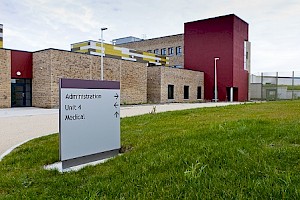Youth Justice
Ireland has a long history of poor responses to offending behaviour by children. A core strand to IPRT's work since its establishment in 1994 has been the promotion of a more effective youth justice system, with emphasis on non-custodial alternatives, diversion, early intervention and prevention strategies and programmes. Central to our work was ending the practice of detaining children in adult prisons, which was in breach of international human rights standards and a serious stain on Ireland's human rights record.
International human rights standards, and in particular the provisions of the UN Convention on the Rights of the Child, are clear that custody for children should only be used as a last resort and for the minimum required period of time. All efforts should be made to apply alternatives to detention to ensure that such a measure is only used in exceptional circumstances.
In Ireland, the Children Act 2001 recognizes the principle of detention as a last resort. The Act prohibits the imprisonment of children and the Criminal Justice Act 2006 makes provision for all children less than 18 years of age to be detained in Children Detention Schools. The detention school model is focused on a model of care, education, health and programmes that address offending, with improved outcomes for the young people, their communities and all of society. The Irish Youth Justice Service is responsible for the Children Detention Schools, within the Department of Children and Youth Affairs.
Following years of sustained advocacy by IPRT, along with many national and international bodies, in 2012 the detention of boys aged under 17 at St Patrick's Institution ended. In March 2017, a Ministerial Order ended the sentencing of children aged under 18 to adult prison in Ireland, and in April 2017, St. Patrick’s Institution was finally closed. Since September 2017 boys aged under 18 are no longer detained in the adult prison system.
IPRT continues to work towards progressive change in youth justice policies and practice, as well as engaging with wider policy and practice issues relating to youth justice, such as the provision of alternatives to detention, diversion and early intervention programmes.

Progress in ending detention of children in St. Patrick's Institution as final 16 year old released, but uncertainty remains for 17 year olds
6th August 2012
Historic moment as the final 16 year old boy is released from St Patrick's Institution, but thirty-one 17 year old boys remain.
IPRT Briefing: Detention of Children in St. Patrick's Institution (updated)
18th July 2012
A short document outlining IPRT's position on the ongoing detention of children in St. Patrick's Institution, together with information on the conditions, the issues and three key recommendations.
Ombudsman for Children's complaints remit extended to children in St Patrick's Institution
25th June 2012
IPRT welcomes the extension of the remit of the Ombudsman for Children to receive individual complaints from children held in St Patrick's Institution.
UK: Pathways to Crime Report
5th June 2012
The T2A Alliance has issued a report identifying ten stages within the criminal justice process which could provide a more effective and rigorous approach for young people, between the ages of 16-24, in their transition to adulthood.
UNESCO: Reviewing the Provision of Education for Young People in Detention
31st May 2012
The UNESCO Children and Youth Programme investigates current issues regarding access to education in child detention in a new report.
Roundup: Reactions to announcement that detention of children in St Patrick's is to end
4th April 2012
Following more than 25 years of commitments by successive governments but little action, the Minister for Children and Youth Affairs yesterday announced concrete plans on bringing to an end the practice of detaining children in St Patrick's Instn, which is an adult prison.
IPRT hails Government’s action on ending detention of children in St Patrick’s Institution as “historic”
2nd April 2012
MEDIA ADVISORY: The Irish Penal Reform Trust (IPRT) has hailed as “historic” the announcement today by Minister for Children, Frances Fitzgerald, that capital funding of €50m is to be made available for the building of the first phase of the National Children Detention Facility at Oberstown in Lusk, and that that the practice of imprisonment of children in Ireland will cease within two years.
2011 conclusions of the European Committee of Social Rights finds youth justice violations in Ireland
8th February 2012
The conclusions of the European Committee of Social Rights for 2011 are now public, and the Republic of Ireland has been found to be in violation of Article 17(1) in two ways relating to youth justice. Also of relevance were the further questions the Committee had regarding the right to education under Article 17(2).
Government receives “fail grade” for inaction on commitment to end imprisonment of children in Ireland
23rd January 2012
The Irish Penal Reform Trust (IPRT) today welcomed the publication of the Children’s Rights Alliance Report Card 2012.
UK: 'Rules of Engagement: Changing the Heart of Youth Justice'
17th January 2012
A policy report by the Centre for Social Justice/Youth Justice Working Group, examining the efficiency of the Youth Justice System in the UK, has just been published.




